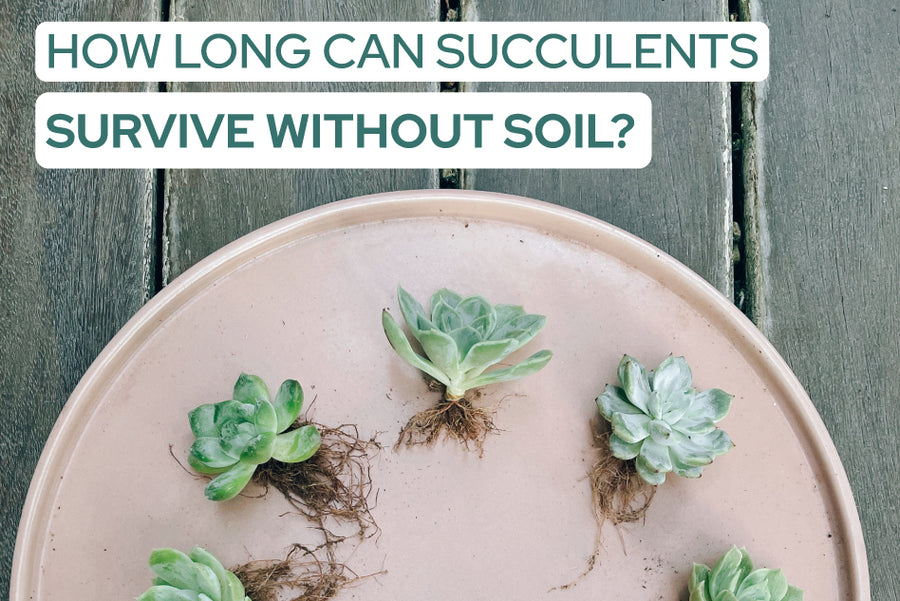Succulents are naturally hardy plants and can live a while without water and, in some cases, inadequate sunlight. But how long can they survive without soil, and can they survive without it altogether?
The Short Answer
Succulents always need some sort of potting medium to protect their roots from damage. However, they can survive up to about two weeks in the open air as long as they’re given proper care and attention.
If you’re planning on making a unique succulent arrangement like a wreath or boutonniere, your succulents’ roots will, unfortunately, be exposed to the open air. These kinds of projects put your succulents on a timer, and you’ll need to take extra care to ensure they stay verdant and vibrant until you’re done using them.

Taking extra care to succulents before making wreath or boutonniere.
Photo by fottograff
Keeping Your Succulents Alive Without Soil
Fortunately, there are quite a few ways to keep your bare-root succulents alive and well. Although they will wilt eventually, these methods can help keep your succulents alive for a while, but you’ll have to repot them or toss them in the compost as soon as possible.
Give them Plenty of Nutrients
Soil is what gives your succulents nutrients to continue growing and the energy to stay alive and well. Without proper nutrients, your succulents will wilt. So, keep them fed with a diluted, water-soluble fertilizer when you water them. The dilution should be about half the amount of fertilizer to your water amount.

Keeping succulents fed with a diluted, water-soluble fertilizer when you water them.
Photo by Yulia Naumenko
Keep Your Succulents Hydrated
Drainage and hydration are a must for bare-root succulents, so you’ll need to water them regularly to avoid letting their roots dry out. However, some soilless arrangements (like terrariums) have poor drainage, and it can be easy to overwater your succulent. We recommend frequent watering with small amounts of water in a syringe or misting your succulent’s roots directly with a spray bottle.
Allow for Adequate Light
Like a rooted succulent, your bare-root succulents need proper lighting. Bright, indirect sunlight is ideal here, mainly because your succulent’s roots may burn if exposed to direct light. Using supplemental UV lamps or keeping your bare-root succulents near an east-facing window works best.

Bright, indirect light is ideal for bare-root succulents.
Photo by Chris Parsons
Using Alternative Potting Mediums
Depending on your arrangement, there are some alternatives to soil to help keep your succulents happy and healthy while in their arrangement. The two most popular alternatives to soil are sphagnum moss and sand. However, you can’t use them interchangeably.
Sand or Rocks
Sand or loose rocks are an excellent alternative to using soil as a potting medium, particularly because there are lots of succulents out there that grow in sand, both in deserts and on beaches. If you’re working with an artistic terrarium arrangement, sand is your best friend, as it can provide something for your roots to grip onto while also protecting them from the sunlight. Some succulents do better in sand than others and may even need a little sand in their potting mixes to begin with:
- Aloe
- Agave
- Shrub succulents, like the Crown of Thorns
- Living Stones and Split Rock
- Groundcover succulents, like the Ice Plant
- Edge succulents, like Sedum and Donkey’s Tail
Sphagnum Moss
Sphagnum moss is another great alternative potting medium florists commonly use in their rooted topiary arrangements. The moss is excellent at absorbing extra moisture, and it gives succulents a lightweight but strong medium for the roots to grab.
The Benefits of Well-Draining Soil
Ideally, you’ll have time to plant your bare-root succulents after using them for whatever purpose they’re arranged for. However, you’ll want to stick with well-draining soil for your potting medium. Since succulents need soil for nutrients, root protection, and something to grip onto, it’s best to stick with well-draining succulent soil overall. To help improve drainage, we recommend using a little coarse sand, perlite, peat, and compost in your mix.
You can also watch this video to see some of the tips in action:
See more about HOW TO CREATE A SUCCULENT PROPAGATION MANDALA?
And get a free plant when your friends make an order. Sign up here!
Learn more about how to nurture and enjoy many gorgeous succulents and clever decoration tips with our newsletter. Let's sign up!






















